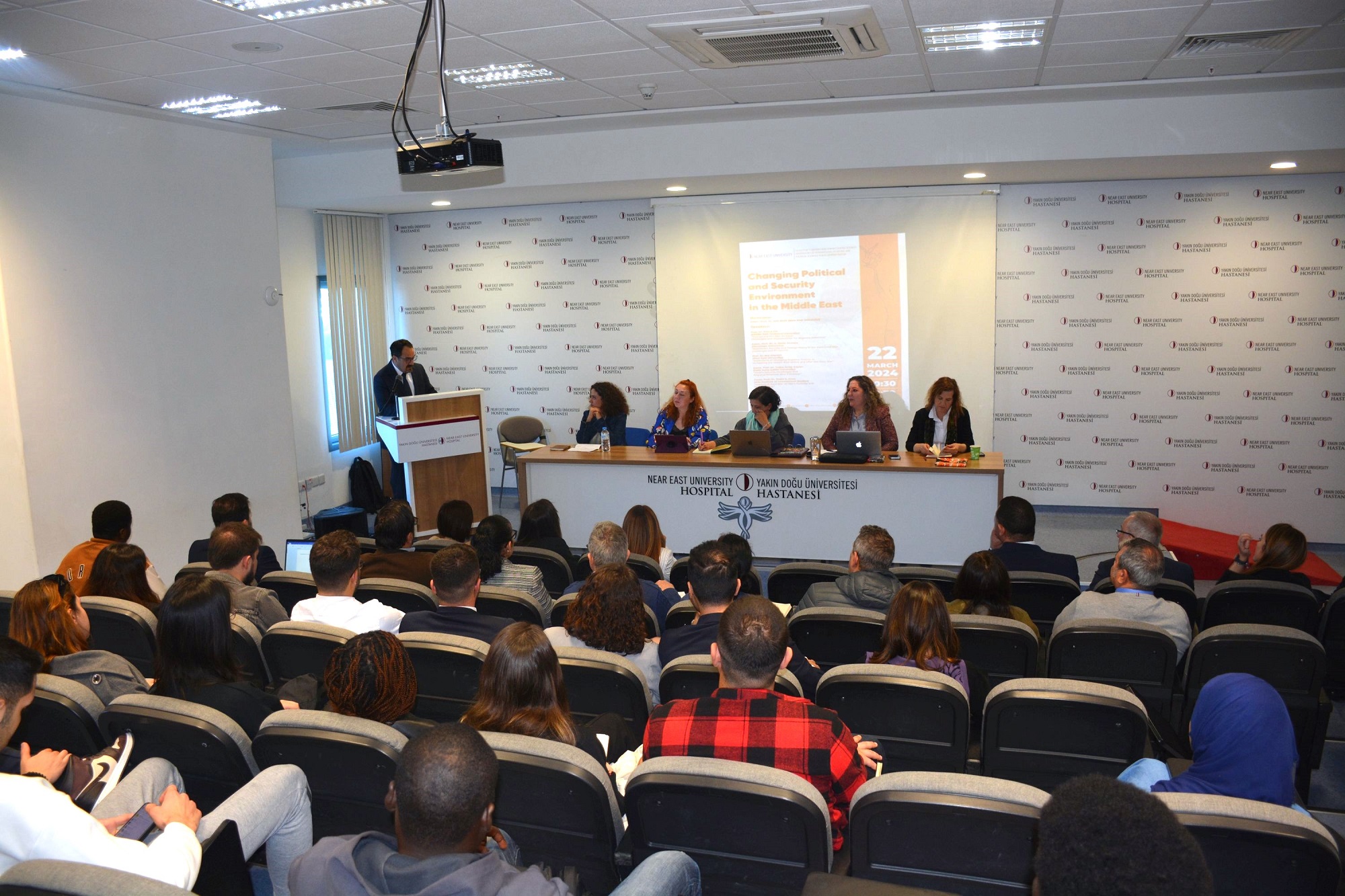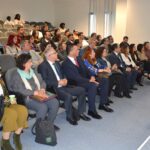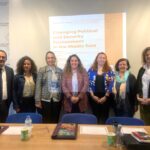
All eyes turned to the Middle East again after Iran launched a UAV and missile attack on Israel in retaliation for Israel’s air attack on the Iranian consulate building in Damascus, the capital of Syria. On the one hand, there are concerns that the conflicts in the region, which are already tense due to the civil war in Syria and Israel’s attacks that caused great destruction in Gaza, will spread to a wider region.
The “Changing Politics and Security Environment in the Middle East” conference, organized by the Departments of Political Science, International Relations and Public Administration of the Faculty of Economics and Administrative Sciences of Near East University, brought together experts in the field and discussed the balances in the region.
The conference, held with the participation of academics from Near East University, Middle East Technical University, Izmir Kâtip Çelebi University, Hacettepe University and Urla International Studies Institute, allowed the current developments in the Middle East to be examined from various perspectives. At the conference moderated by Near East University International Relations Department Head Assoc. Prof. Dr. Sait Akşit, the developments caused by the Israeli-Palestinian war, its possibilities and its reflections on the region were discussed. At the conference, it was emphasized that there should be a political and economic paradigm change in order to take steps towards the peace process in the Middle East. It was stated that while the uncertainty regarding the ceasefire in the Gaza war continues, a paradigm shift is unlikely to occur, and the lack of a strong international actor that could lead to such a development was emphasized.
What awaits the Middle East?
At the “Changing Politics and Security Environment in the Middle East” conference held at Near East University; Assoc. Prof. Dr. Tuğçe Ersoy Ceylan from Izmir Kâtip Çelebi University discussed the topic titled “Israel’s Security Problems and Regional Relations after October 7”, Assoc. Prof. Dr. A. Ömür Atmaca from Hacettepe University spoke on “Palestinian Security and Foreign Policy After the Gaza War: Challenges and Expectations”, Prof. Dr. Nur Köprülü from Near East University made a presentation on “Reflections of Changing Regional Politics on the Re/Formation of the Middle East Before and After the Gaza War”. Assoc. Prof. Dr. Özüm S. Uzun, Director of Urla International Studies Institute spoke on “The Effects of the Gaza War on Iran’s Security and Foreign Policy” and Prof. Dr. Özlem Tür from Middle East Technical University made presentations titled “Türkiye and the Gaza War: Challenges and Opportunities for Regional Relations”.
Iran is trying to protect its position!
In her presentation, Urla International Studies Institute Director Assoc. Dr. Özüm S. Uzun stated that there is continuity and consistency in Iran’s foreign policy approach and emphasized that the Iranian administration is trying to consolidate its regime. She stated that Iran is trying to maintain its influence in regional countries such as Lebanon, Iraq and Bahrain, where there are large Shiite populations and minorities in the Middle East, and that it is trying to keep a strong resistance position based on anti-Americanism and anti-Israel sentiment.
Assoc. Prof. Dr. Tuğçe Ersoy Ceylan from Izmir Kâtip Çelebi University, in her presentation, said that Hamas’s attack showed that Israel’s technology-oriented defense doctrine was insufficient to deal with traditional methods. Assoc. Prof. Dr. Ceylan said that Israel’s counter-attack caused great destruction and civilian casualties in Gaza and emphasized that these attacks did not create a change in the administrative structure of Gaza.
Differences between Fatah and Hamas complicate solution in Palestine
Assoc. Prof. Dr. A. Ömür Atmaca from Hacettepe University touched upon the problems within Palestine. Assoc. Prof. Dr. Atmaca emphasized that, in addition to geographical fragmentation, political differences between Fatah, which controls the West Bank, and Hamas, which controls Gaza, cause serious uncertainties about the situation and future of Palestine. Assoc. Dr. Atmaca emphasized that the war in Gaza would further deepen the inadequacy of Mahmud Abbas’s diplomatic efforts and the economic difficulties of the Palestinians, he also stated that a possible solution initiative should also include Hamas.
Speaking at the conference, Near East University Faculty of Economics and Administrative Sciences Vice Dean and Head of Political Science Department Prof. Dr. Nur Köprülü also discussed how the war affected the dynamics in the region. Prof. Dr. Köprülü stated that during the normalization process in the pre-war region in Gaza, Israel took an approach based on improving its relations with Arab countries, and in this process, initiatives such as the “deal of the century” and the Abraham Accords proposed by former US President Trump ignored the Palestinian issue. Stating that this situation is one of the main reasons for Hamas’ attacks, Prof. Dr. Köprülü examined the positions of the countries in the region and emphasized that Egypt and Jordan, in particular, approached the problem cautiously, and that Qatar and Egypt came to the fore in their mediation role and took steps to limit the regional effects.
Prof. Dr. Özlem Tür from Middle East Technical University. in her presentation stated that Turkey’s attitude towards the Gaza War first showed a cautious and balanced approach that included a mediation proposal, but then turned into a pro-Hamas attitude that included serious criticism of the Israeli administration. Stating that Turkey’s critical attitude towards Israel increased due to the increase in Israeli aggression in the Gaza War, Prof. Dr. Tür stated that although this situation interrupts the Turkish-Israeli rapprochement, it is seen that Turkey does not want to completely ignore relations with Israel.







